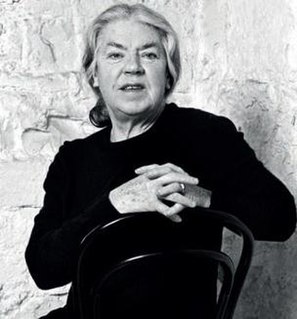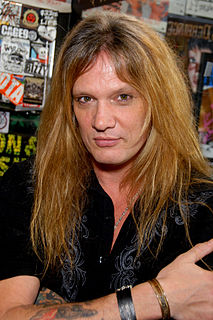A Quote by William Saroyan
This is what drives a young writer out of his head, this feeling that nothing is being said.
Related Quotes
Roman Polanski actually said as much to me once. He had his head in his hands, and I said, "Roman, I've got to tell you, as an actor, seeing the director with his head in his hands... Look, I really want to do what you want me to do." And he went away and he came back, having obviously thought about what I said. And he said, "When my head is in my hands, I'm closing my eyes and trying to remember what I saw in my head, before any of the stuff."
He’s not feeling well,” Clary said, catching at Simon’s wrist. “We’re going.” “No,” Simon said. “No, I — I need to talk to him. To the Inquisitor." Robert reached into his jacket and drew out a crucifix. Clary stared in shock as he held it up between himself and Simon. “I speak to the Night’s Children Council representative, or to the head of the New York clan,” he said. “Not to any vampire who comes to knock at my door —“ Simon reached out and plucked the cross out of Robert’s hand. “Wrong religion,” he said.
It is easier for the reader to judge, by a thousand times, than for the writer to invent. The writer must summon his Idea out of nowhere, and his characters out of nothing, and catch words as they fly, and nail them to the page. The reader has something to go by and somewhere to start from, given to him freely and with great generosity by the writer. And still the reader feels free to find fault.
A writer like me must have an utter confidence, an utter faith in his star. It's an almost mystical feeling, a feeling of nothing-can-happen-to me, nothing-can-touch-me.... I once had it. But through a series of blows, many of them my own fault, something happened to that sense of immunity and I lost my grip.
Karrin smiled faintly and shook her head. "He always said you knew ghosts. You're sure it was really him?" Mort eyed her. "Me and everyone else, yeah." Karrin scowled and stared into the middle distance. Mort frowned and then his expression softened. "You didn't want it to be his ghost. Did you?" Murphy shook her head slowly, but said nothing. "You needed everyone to be wrong about it. Because if it really was his ghost," Mort said, "it means that he really is dead." Murphy's face...just crumpled. Her eyes overflowed and she bowed her head. Her body shook in silence.
In the greatest fiction, the writer's moral sense coincides with his dramatic sense, and I see no way for it to do this unless his moral judgement is part of the very act of seeing, and he is free to use it. I have heard it said that belief in Christian dogma is a hindrance to the writer, but I myself have found nothing further from the truth. Actually, it frees the storyteller to observe. It is not a set of rules which fixes what he sees in the world. It affects his writing primarily by guaranteeing his respect for mystery.
Now don't go wandering off, William," she said with a meaningful glance. "I don't want to lose you in the crowd." Will's jaw set. "I'm getting the oddest feeling that you're enjoying this," he said under his breath. "Nothing odd about it." Feeling unbelievably bold, Tessa chucked him under the chin with the tip of her lace fan. "Simply behave yourself.
It is only the basest writer who cannot speak of the sea without talking of "raging waves," "remorseless floods," "ravenous billows," etc.; and it is one of the signs of the highest power in a writer to check all such habits of thought, and to keep his eyes fixed firmly on the pure fact , out of which if any feeling comes to him or his reader, he knows it must be a true one.






































